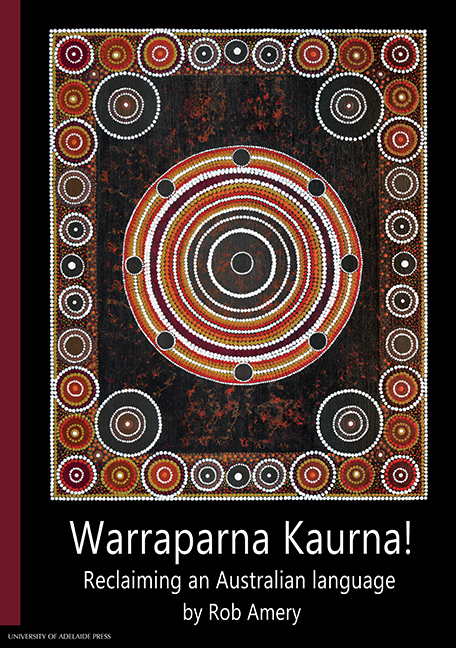Book contents
- Frontmatter
- Contents
- Maps, Plates, Graphs and Tables
- Preface to this Edition (2016)
- Foreword to the 2000 Edition
- Preface to the 2000 Edition
- Acknowledgements
- Abbreviations
- Conventions and Terminology
- Chapter 1 Locating the Study
- Chapter 2 Language Reclamation
- Chapter 3 An Ecological Approach to Language Revival
- Chapter 4 A Sociolinguistic History of Kaurna
- Chapter 5 Kaurna Sources
- Chapter 6 Restoring and Transforming the Kaurna Language
- Chapter 7 Kaurna Language Programs
- Chapter 8 Kaurna in Society
- Chapter 9 Kaurna Language Revival: The Formulaic Method
- Chapter 10 Sociopolitical Dimensions of Kaurna Language Revival
- Chapter 11 Into the Twenty-first Century: Developments since 2000
- Chapter 12 Summary and Conclusions
- Bibliography
- Index
Chapter 4 - A Sociolinguistic History of Kaurna
Published online by Cambridge University Press: 28 July 2017
- Frontmatter
- Contents
- Maps, Plates, Graphs and Tables
- Preface to this Edition (2016)
- Foreword to the 2000 Edition
- Preface to the 2000 Edition
- Acknowledgements
- Abbreviations
- Conventions and Terminology
- Chapter 1 Locating the Study
- Chapter 2 Language Reclamation
- Chapter 3 An Ecological Approach to Language Revival
- Chapter 4 A Sociolinguistic History of Kaurna
- Chapter 5 Kaurna Sources
- Chapter 6 Restoring and Transforming the Kaurna Language
- Chapter 7 Kaurna Language Programs
- Chapter 8 Kaurna in Society
- Chapter 9 Kaurna Language Revival: The Formulaic Method
- Chapter 10 Sociopolitical Dimensions of Kaurna Language Revival
- Chapter 11 Into the Twenty-first Century: Developments since 2000
- Chapter 12 Summary and Conclusions
- Bibliography
- Index
Summary
Taking the things we need to survive as a race of people with us for our childrenNOW, we may still have life TOMORROW. Without a Cultural Identity we willbe lost, with no sense of place; our spirit will die and we will enter into theDreaming of the White Man's Nightmare.
(Georgina Williams, 1984: 24, in Mattingley & Hampton, 1988: 155)The Kaurna's is a remarkable story of survival, re-emergence and transformation of an identity and culture that was largely shattered by European invasion of their lands more than 160 years ago. The population was decimated by disease and the people were forced off their lands, but the roots were not completely severed.
In recent times, the Kaurna have regrouped and are forging a distinctive Kaurna identity which is shaped by their past history. The Kaurna in the 1990s are characterised by both continuities and discontinuities with the past. This is reflected in the attention given to archaeology and prehistory by Kaurna people themselves. The Kaurna draw on a long-standing connection with the Adelaide Plains, which has only recently been disrupted by the European invasion.
Early observers of the Kaurna sometimes wrote glowing reports in the tradition of the ‘noble savage’. They were described as ‘superior’ to other Aboriginal groups. Colonial officials tried to present a picture of peace and harmony and of the Kaurna people welcoming the colonists to their lands. Later reports, however, pointed to the ‘degraded’ nature of the Indigenous peoples of the Adelaide Plains, after many apparently resorted to begging and prostitution following the theft of their lands. By the late 1840s, the Kaurna were portrayed as a weak remnant of a once proud people. As early as 1850, some writers were claiming that the Kaurna were virtually ‘extinct’.
From 1850 onwards, the scant references to the Kaurna typically refer to some surviving remnants of the former ‘Adelaide Tribe’. For instance, Cawthorne knew of the existence of just five Kaurna individuals belonging to one family in 1861 (Hemming, 1990: 132). Even Teichelmann, who had spent so much effort in documenting the language, referred in 1858 to the Kaurna as no longer existing.2 The few later nineteenth-century references invariably refer to the ‘Adelaide Tribe’ as ‘extinct’ (e.g. Woods, 1879: ix; Stephens, 1889), and this belief was general among Europeans at the turn of the twentieth century.
- Type
- Chapter
- Information
- Warraparna Kaurna!Reclaiming an Australian language, pp. 56 - 84Publisher: The University of Adelaide PressPrint publication year: 2016



